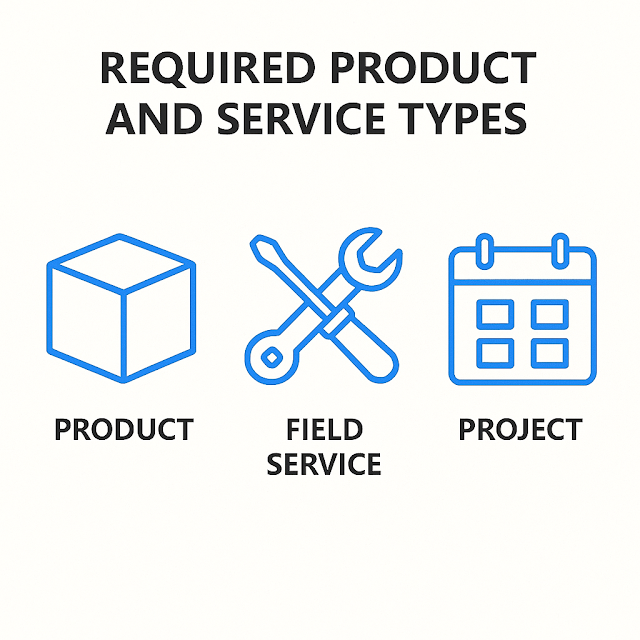Dynamics 365 Field Service : Create and configure required product and service types
In Dynamics 365 Field Service, Product Types and Service Types play a critical role in defining what is delivered to the customer—whether it’s a physical item, a service, or an internally used part. They help standardize work orders, inventory usage, billing, and reporting.
Product Types in Dynamics 365 Field Service
Products are physical goods associated with a work order. Dynamics 365 Field Service supports three types of products:
- Customer Asset (or Equipment)
- Products sold and installed at the customer site.
- Tracked as assets for future maintenance and service history.
- Example: HVAC system, elevator, or router installed at a customer’s premises.
- Inventory
- Parts or materials taken from the company’s warehouse or technician’s van stock.
- Consumption reduces stock levels in real-time.
- Example: Fittings, wires, air filters, or replacement parts.
- Non-Inventory
- Items that do not require tracking in inventory.
- Often used for low-cost or frequently used items.
- Example: Screws, glue, packaging material.
Benefits of Using Product Types:
- Accurate inventory management and forecasting.
- Automated asset tracking upon installation.
- Cost calculation and billing accuracy.
Service Types in Dynamics 365 Field Service
Service Types define the labor and technician time associated with a work order. These are essentially predefined service tasks.
Each Service Type can include:
- A description of the task (e.g., “Install water purifier”).
- Estimated duration (e.g., 90 minutes).
- Estimated cost and price.
- Skills required (e.g., Electrical Certification).
- Applicable incident types.
Examples:
- Annual maintenance inspection
- Air conditioning system repair
- IT system diagnostics
Why It’s Important:
- Standardizes recurring service tasks.
- Helps technicians and dispatchers understand time and skill expectations.
- Useful for analytics and SLA performance tracking.
- Reduces manual entry for common services.
Integration with Work Orders
When creating a Work Order:
- Product Types determine what items are required or consumed.
- Service Types define the work to be performed and duration.
- This drives scheduling, inventory updates, time tracking, and billing.
Summary of Importance
- Helps streamline operations with standardized product and service definitions.
- Enhances scheduling accuracy and technician readiness.
- Provides better control over costs, pricing, and margins.
- Supports automation, from work order creation to invoicing and reporting.












Comments
Post a Comment